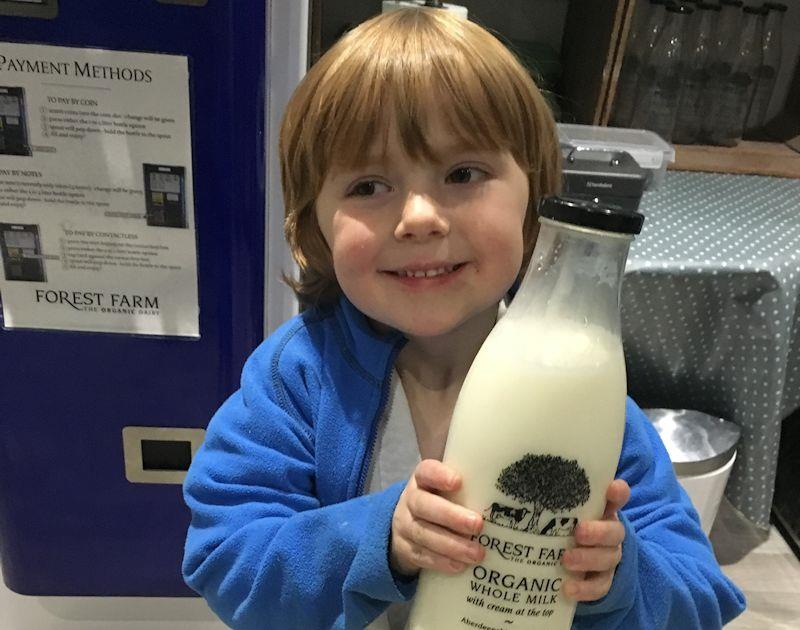
Make 2019 count - Food and drink for sailors who care about the environment
by Gael Pawson 5 Jul 2019 04:00 PDT

An organic dairy sells direct to the public with reuable glass bottles, meaning no plastic bottles wasted - Sailors caring for their environment © Gael Pawson
There are a number of ways we can make our food and drink choices more sustainable. We are going to concentrate on two main strands here. First packaging and simple ways to slim down our plastic use and second the actual food we choose to consume.
Food and drink packaging
This applies to both the food and drink you buy when dining at home, as well as at the sailing club and when you're away or on your way to an event.
The way that so many people now routinely use refillable water bottles rather than single use plastic ones is one of those significant changes in behaviour that should fill us full of hope. Avoiding the single use plastic bottles where you can, or if you have to use one, ensuring that it is recycled (take it home with you and put it out with your recycling rather than let it go into landfill).
The next step, if you are one for getting hot drinks out and about, is a reusable hot drink cup; as a bonus you'll find most of the big coffee chains will also give you a discount if you use your own cup. If you have to use a single use cup, compostable is best, try to avoid using a lid if you can - remind yourself in every part of your life is you save these tiny bits of plastic it will all add up.
Another useful thing to have with you if you are in the habit of eating out and about is reusable cutlery - even just a small bamboo spoon can save using plastic spoons on multiple occasions. A spoon and fork will pretty much cover you for most things, and if you have a lunch box that you can pop takeaway cake or sandwiches in, rather than using plastic, all the better. Another useful item is reusable wrap, there are plenty of these about now: beeswax ones are increasingly popular and will work well to wrap all kinds of things.
Buy loose fruit and veg and try to avoid using bags - either take your own reusable bags or simply buy loose. Make an effort to notice the packaging on food and choose accordingly - one example is pizzas - some brands have polystyrene bases, others have cardboard - even better make your own. Some meat has a plastic tray as well as a film wrapper, some fruit is in a plastic tray, try wherever you can to minimise the packaging as even if it recyclable, if it isn't needed it's a waste of resources. Try taking your own containers and buying from butchers or supermarket meat counters. Sounds obvious, but with a bit of extra care you can cut right down. There are an increasing number of zero waste shops where you can refill essentials like rice, pasta and all sorts of other items we as a society have become used to buying pre-packaged.
Sustainable goals to reduce food packaging:
- Carry a reusable water bottle.
- Carry a reusable coffee cup if you regularly buy takeaway hot drinks.
- Carry reusable food containers or wrap for takeaway food.
- Carry reusable cutlery.
- Use reusable bags to carry your shopping.
- Use re-fillable containers where you can.
- Suggest changes where you come across unnecessary packaging at your club
The food and drink we consume
There are a number of factors to consider with your food and drink choices. Meat takes a lot of energy to produce and there is a strong argument for reducing or even eliminating it from your diet. As we have been keen to point out in all our articles, we are fans of achievable goals and plenty of people aren't ready to give up meat, but maybe you replace one meal a week or one meal a month with a vegetarian alternative. And thinking about where that food comes from and how it has been produced, has it been produced locally, is it in season, and trying to avoid wasting food.
Meal planning really does help reduce waste. A good way to use up spare food is making soup, pasta dishes are also great for using up odds and ends as a pasta sauce can use up many of the odd bits of veg lurking in your fridge.
Cooking from scratch using local, fresh ingredients is better for us health-wise, but it's also better for the planet. Try small simple steps as they work for you - for example I'm making bread and soup and using loose leaf tea now, and my next steps are to cut out pre-packaged granola and pizza.
Questions to consider about the food you consume:
- How it is produced? Choose organic, seasonal produce where you can.
- Pick sustainable producers where you can - farms that are focused on looking after the soil, not just stripping out its nutrients.
- Is it local? Minimise food miles.
- Do you need it? (Yes, buy less buy smarter applies to food too)
- Consider cutting down your meat consumption.
- Chicken or pork has a much lower carbon footprint than beef or lamb.
- Is there a way to eliminate or reduce packaging?
- Let your choices be governed by sustainability rather than purely price where possible - remind yourself.
There are plenty of opportunities on social media to find out more - pages like Portland for the Planet covering the area around Portland, Weymouth, are full of great ideas and information.
There are some useful ideas and a handy downloadable checklist [PDF] on the Plastic Free July website: www.plasticfreejuly.org